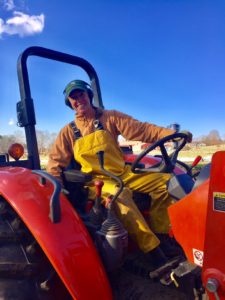 As a first-generation farmer, Susan Mitchell found her purpose when she decided to pursue a career in agriculture. She currently rents land at a former dairy farm in Mansfield and runs Cloverleigh Farm, a four-year old business producing certified organic vegetables, herbs, and flowers. Cloverleigh Farm focuses on a Community Supported Agriculture (CSA) program whereby community members invest in the farm and receive a weekly supply of produce, while forming an in-depth connection to a local farm. In addition, she sells to the Willimantic Food Co-op, local school district, and a few restaurants in the area. However, without access to affordable farmland to purchase, many new and beginning farmers are unable to invest in infrastructure for their farm businesses. Susan is no exception. Because she does not own the land she farms, she is unable to expand the area that she cultivates, build structures, or invest in perennial crops. As Susan searches for a new place to farm, she says, “Affordability is a primary concern with any potential farm property, as is the quality of the land. As an organic vegetable, herb, and flower producer, high-quality soil is of the utmost importance.”
As a first-generation farmer, Susan Mitchell found her purpose when she decided to pursue a career in agriculture. She currently rents land at a former dairy farm in Mansfield and runs Cloverleigh Farm, a four-year old business producing certified organic vegetables, herbs, and flowers. Cloverleigh Farm focuses on a Community Supported Agriculture (CSA) program whereby community members invest in the farm and receive a weekly supply of produce, while forming an in-depth connection to a local farm. In addition, she sells to the Willimantic Food Co-op, local school district, and a few restaurants in the area. However, without access to affordable farmland to purchase, many new and beginning farmers are unable to invest in infrastructure for their farm businesses. Susan is no exception. Because she does not own the land she farms, she is unable to expand the area that she cultivates, build structures, or invest in perennial crops. As Susan searches for a new place to farm, she says, “Affordability is a primary concern with any potential farm property, as is the quality of the land. As an organic vegetable, herb, and flower producer, high-quality soil is of the utmost importance.”
According to a 2017 report written by the National Young Farmers Coalition, access to land is the number one challenge faced by new and beginning farmers, particularly finding and affording land on a farm income. With the high cost of farmland in Connecticut, Susan is not alone in her quest for affordable farmland that has prime and important soils. Protected farmland is often the only affordable land option for young and beginning farmers. Connecticut’s Farmland Protection Program and the Community Farm Preservation Program are key programs that offer existing farmers a way to extract equity from their land without having to sell it for development—enabling them to retire, transfer the farm, or reinvest in and expand their farm business. Without adequate funding, the state’s Farmland Protection Program cannot purchase agricultural conservation easements and thus meet the needs of young and beginning farmers for affordable land options and/or flexible leases that lead to land access and ownership. State-owned farmland would also not remain available for new and beginning farmers without the support of the Farmland Protection Program.
Susan is seeking a new farm with a house, barn and high-quality farmland that is mostly flat with 10-20 tillable acres in Mansfield/ Storrs, Ashford, Coventry, Tolland, Chaplin, Ashford, or Windham. She noted that if possible, she would ideally like additional land for pastured livestock or maple sugar production. If you or anyone you know has farmland that meets her criteria, please contact her at: cloverleighfarm@gmail.com.




